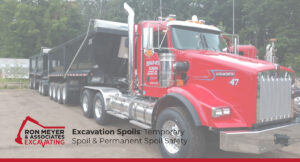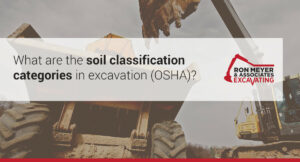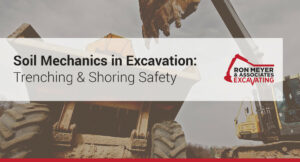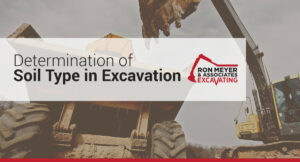Spoil piles are excavated materials consisting of topsoil or subsoils that have been removed and temporarily stored during the construction activity. [Source] Spoil piles are also sometimes referred to as Soil Piles, Stock Piles, or Storage Piles. There are generally two types of excavation spoil: Temporary Spoil Permanent Spoil The differences are pretty straightforward, but […]
Soil
Read posts about Soil from Ron Meyer & Associates Excavating, West Michigan excavation contractors.
What are the soil classification categories in excavation? (OSHA)
Some of the compliance methods permitted under the Excavation standards require a competent person to classify soil and rock deposits as: Stable rock Type A soil Type B soil Type C soil Stable Rock Natural solid mineral matter that can be excavated with vertical sides and remain intact while exposed. Type A Cohesive soils with […]
Soil Mechanics in Excavation: Trenching & Shoring Safety
Introduction to Soil Mechanics Soil mechanics is a branch of soil physics and engineering mechanics that describes the behavior of soils. It differs from fluid mechanics and solid mechanics in the sense that soils consist of a heterogeneous mixture of fluids (usually air and water) and particles (usually clay, silt, sand, and gravel) but soil […]
Determination of Soil Type in Excavation
OSHA categorizes soil and rock deposits into four types, as follows: Stable Rock Stable Rock is natural solid mineral matter that can be excavated with vertical sides and remain intact while exposed. It is usually identified by a rock name such as granite or sandstone. Determining whether a deposit is of this type may be […]



